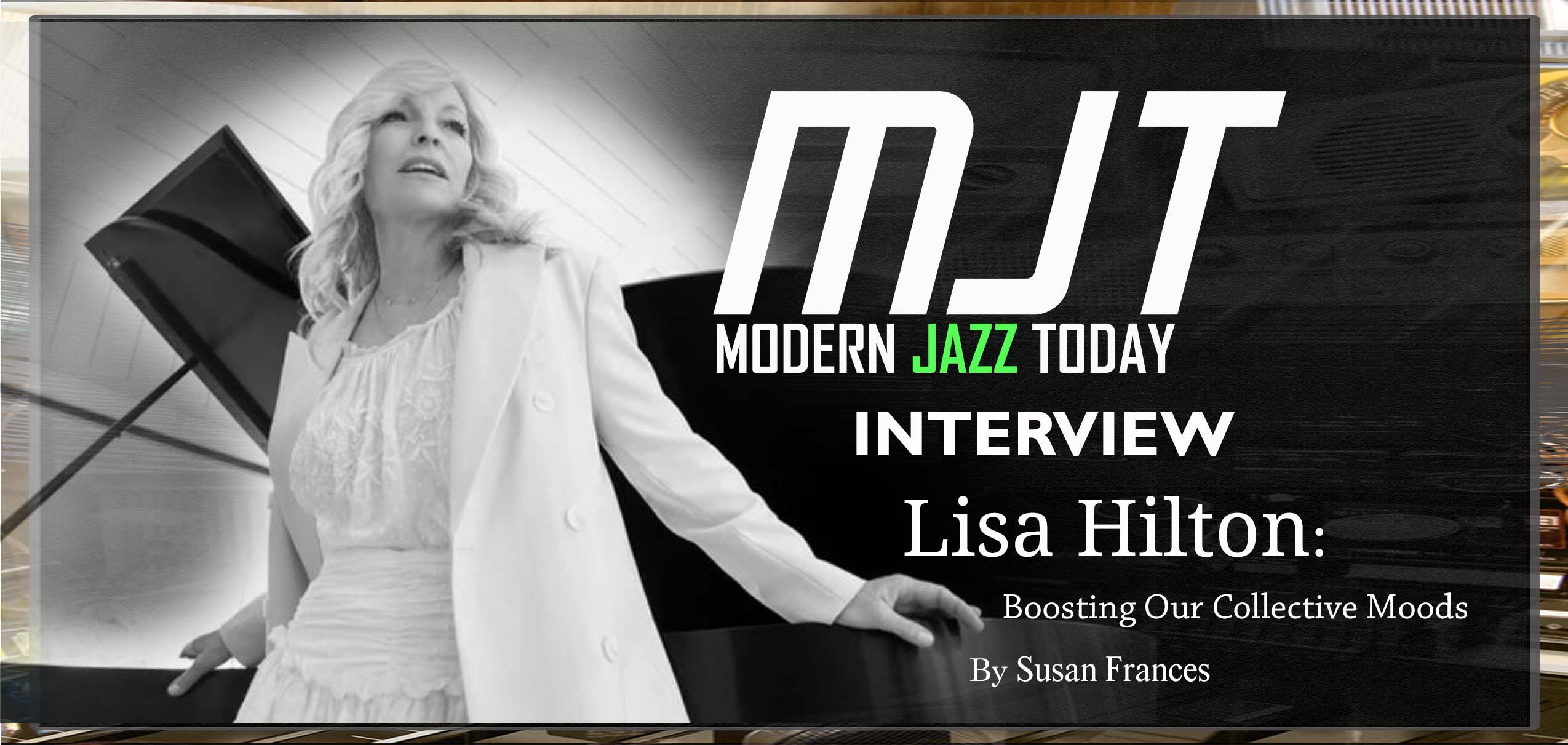Lisa Hilton: Boosting Our Collective Moods
by Susan Francis

She amplifies, “I think music, especially jazz, is really important to boost our collective moods. I hope that we connect with listeners around the world because we can all use a mood boost!”
She remarks on the subject of jazz, “I think I was always attracted to the qualities of jazz that I found in the classical music I studied. I always loved syncopated rhythms, cool harmonic sounds, and a feeling of freedom that you can hear in some composed music. Even as a young girl, I was trying to break free of classical structures – I couldn’t understand why I had to learn how to play a waltz, a minuet, or a gavotte!”

Hilton enjoyed listening to jazz, blues, and soul and was inspired to participate in making such music. But, she recalls, “As long as my memory goes back, I have loved the piano.”
“When I was about six years old,” she recounts, “I begged my mother for piano lessons. Since I was the third daughter out of four, my mom had experience with my two older sisters taking piano lessons and never practicing, so she told me that she didn’t think I would practice either. I promised to practice, but she said I could have lessons when I was eight if I still wanted them, but not earlier.”

“I still have two of my early compositions,” she touts proudly, “but they are extremely simple. Once I could accurately read music, I completely forgot about writing my own.”
“As a teenager, though,” she observes, “I started to resist the endless classical and nineteenth-century pieces I was assigned. I yearned to play something cool, and a minuet wasn’t what I considered cool. So I started stringing together phrases I liked and ended up writing a blues tune, and every time I played it, people said they really liked it. I didn’t have any education in jazz or blues or composing, I just wrote what I liked to hear and play, and I still continue to write that way.”
Playing what she enjoyed hearing is a technique that Hilton honed into her own distinct style with whatever trimmings, including the bass, drums, brass, and woodwinds, she was motivated to add. Her debut recording Seduction contains 12 original numbers written by her and one cover, “The Way You Look Tonight,” by Jerome Kern and Dorothy Fields.
When discussing the making of Seduction, she reveals, “This question brings me back to a painful time. In college, I switched majors from music to art & design after a particularly difficult music teacher. After graduating, I moved to Los Angeles to make a go of it as a photographer or designer.”
She recollects, “Although it was difficult starting out in a new big city, I did find steady work as an art director in film and television, designing movie posters and TV ads – that kind of thing, but the pressure and deadlines were crazy! Those big budgets on films come with high-stress loads.”
“After a couple years of that,” she notes, “I wanted a creative change and explored different creative directions. I wrote a popular children’s book, If Dinosaurs Were Alive Today, at that time, but I seemed unable to really get a new career direction going.”
“In desperation for more creativity in my life,” she attests, “I started playing piano again – something I had not done for years. Of course, I played some waltzes, minuets, and sonatas, which, again, I still didn’t really like to play! So I started playing the one song I began writing as a teenager, finished it up, and called it ‘Seduction.'”

“After I had enough solo piano compositions,” she remembers, “a friend suggested I record them. Well, that was the first time I had ever been in a studio or heard myself play; the small town I was from did not have recording facilities like that, so it was incredibly humbling to really hear myself for the first time. I had no experience at all in recording, but there were talented people at the studio, so I got lucky working with good engineers from the beginning.”
“Although I was new to the music business,” she cites, “in my career as an art director/designer, I was used to overseeing projects, so it was similar to what I had already been doing.”
She broaches, “About that time, I had the opportunity to see songwriter/producer/pianist David Foster sitting at his piano talking about the songs he had written and how they came about. Seeing him talking about composing really affected me, and it inspired me to continue my musical path.”
“I really had been at a low point in my life.” she explores, “and felt lost until I returned to the piano and began composing and playing regularly again, so it seemed like the new creative path I had been searching for. It’s always challenging, but I love what I do now.”
Playing music she enjoyed hearing set her on a never-ending path as she reflected, “I never intended to record a second or third or twenty-sixth album, but the creativity keeps coming, so I continue to compose and record. I don’t try, and tour/compose/produce/market/practice all at once, though.”
She considers, “I give each [recording] a period where I’m focused mostly in one area to keep a better life balance. The creative part is the most best part of all – it is my passion and reward after all the marketing tasks that artists have to do these days!”

“Music, or any art,” she imparts, “is rooted in what is happening in our culture at that time, so I don’t want to force or control the outcome. Later, when I develop the music further, I can feel a theme and guide it a little bit.”
“When we were in the studio,” she discovered, “I was impressed by how upbeat the music felt – no doubt a response to coming out of a historic pandemic. The title, Paradise Cove, was a reference to our cultural need to find a ‘cove’ or protected spot in our personal lives to escape, or reboot and to create a ‘paradise’ or state of grace amid today’s fast-moving times.”
Joining Hilton on Paradise Cove is Igmar Thomas on trumpet, Luques Curtis on bass, and Obed Calvaire on drums. She details, “I first played with Luques Curtis in 2018 at the Smithsonian in DC. He’s a great bassist, and I love his soloing on this album!
“His roommate at Berklee College of Music.” she provides, “was Igmar Thomas, so when I mentioned bringing in a new trumpeter, he suggested Igmar, and I’m glad he did – it was a real treat recording with him.”
She affirms, “I had been thinking about working with Obed Calvaire for about three years, so I’m glad he was able to join us for this session. Obed is a very creative drummer, as well as a strong leader.”

The path to being a recording artist also set Hilton on the road to starting her own publishing company and record label. She illuminates, “Originally, I don’t know if I had a choice but to start my own publishing company: I had made the choice to stay home and raise a family instead of going out on tour, so I don’t know if I would have had any publishing opportunities. I had read that Joni Mitchell had successfully held onto all her publishing, so I decided to use her as my role model.”
“Since I started in publishing though,” she discerns, “the industry has created more areas where you can be paid as a composer, as a publisher, and as a performer, which is all great! It also means there are a LOT more publishing tasks now that there are more areas to get paid, and with a large catalog of compositions, the time and tedium can add up in the publishing arena.”
“With the average streaming income of $.003 per stream per tune,” she evaluates, “those paychecks are not equal to the time you put in either, so yes, it takes a certain type of musician to run their own publishing company!”
She attributes the challenge of earning a steady income from her music to a market that has needed to open itself up to female performers. It’s a challenge that she feels she continues to face. “It’s terrific that we see a LOT of women as instrumental performers and singers now,” she applauds, “and they are doing really well on the jazz radio/streaming charts.”

“It seems so silly to me,” she ponders, “imagine only reading books or poetry written by men or only looking at photographs taken by men? It’s time for jazz, classical, and opera to catch up to the idea that women are, and always have been, creators and that audiences everywhere deserve a bit more variety in what they see and listen to.”
“As a creator,” she deems, “I’m really glad to be a part of helping to make this change in our culture that is definitely overdue.”
Organizations that have been very welcoming of Hilton’s efforts are healing institutions like Perkins School for the Blind, the Chicago Lighthouse for the Blind, and Visually Impaired, in addition to Junior Blind of America. She describes how she became involved in these healing centers, “I feel that if music means so much to me, it would probably mean even more to someone if they did not have sight, so I chose to perform at the local Camp Bloomfield in Malibu for kids that are blind or visually impaired, operated at the time by Junior Blind of America.”
“It was challenging but rewarding,” she ascertains, “and I found that I really liked the kids.”

“That performance,” she singles out, “led to being asked to go to Chicago Lighthouse for the Blind and perform for them for about ten years! A simple act of playing the piano for others has led me to so many cool experiences, great memories and has enlarged my view of what we label a ‘disability.’ I’ve met so many incredible people that when I perform for visually impaired students, it’s normally my favorite show on the tour!”
Performing live at these institutions is a different experience for Hilton; as she illustrates, “In the studio, we record a tune three times, so you get to enjoy playing together. In a concert, you play something only once – so you don’t have a chance to really catch everything that is happening, but I enjoy sharing the why behind each composition and connecting with the audience.”
“I think when I perform live,” she proposes, “I don’t really know if the audience is enjoying it until the end, so for any audience, large or small, we’re always trying to do our best.”
Being her best has been a theme throughout Hilton’s life from the time she decided to learn to play the piano then discovering her skill to compose original material. She assesses, “I left the piano at nineteen years old, and by the time I returned to it, I had lost a LOT of skills, and I had to figure out how to acquire these skills back fairly quickly. Now, I choose to improve because it’s fun.”

She projects, “Sometimes I imagine how well I’ll play by the time I’m really old, and I can actually get excited just thinking about that! Growing, challenging yourself, and accomplishing new things always makes you feel good, so that’s why I plan to keep doing them.”

Hilton channels the everyday beauty she sees around her into her music, making her music a reflection of the beauty she wishes to communicate to audiences. Her music is stylish, soulful, spirited, and sophisticated. Her material isn’t merely fashionable or chic but a visceral part of herself, of her explorations and discoveries, targeted to boost the collective mood.
About Susan Frances:






No Comments